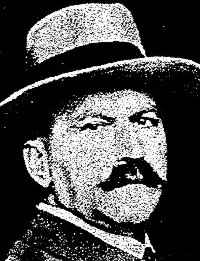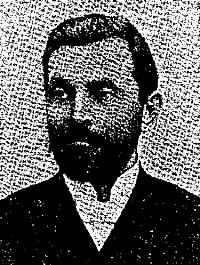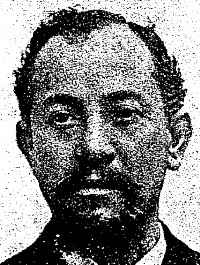
|

|

|
|
|
[Pages 40-41]
(Czech Republic – 49°25'30” 13°52'54”))
Compiled by expert teacher Jan Kára, Blatná, from notes[1] by Mgr. P. Jan Hille
Translated from the original Czech by Jan O. Hellmann/DK
Edited in English by Rob Pearman/UK
The first Jew to settle in Blatná was Jarolým (Jeroným). He helped Count Václav of Rozdražov with grain and maybe also with money. The count mentions him in a letter from 1622 to the countess, telling her to turn to Jarolým in case of need. Jarolým's cottage burned down the following year, together with 36 other cottages, and he may therefore have moved out of the town.
In 1683, Šalamoun Samuel Votický was admitted to Blatná, where he leased the distillery and potassium mill. He lived not far from the manor in a place that is still called Židovna (Jewish place). He paid a yearly rent of 175 guilders and tax of 9 guilders, and dealt in cloth, wool and dry goods. He was 50 years old in 1713 and had lived in Blatná for 30 years, his wife Kateřina was 48 years old. His sons were Isák, aged 13, and Jakub, aged 3. His daughters were Sára, 15 years old, and Anelle, also 3 years old. He was from the tribe of Levi.
After him, the Blatná distillery was leased by Marek Votický, who was also of the tribe of Levi. In 1713, he was 38 years old and his wife Majdalena was 34 years old. He had two daughters: Ester, 15, and Krandl, 11. His son Josef was 17 years old. He paid rent of 150 guilders and tax of 7 guilders. He dealt in both wool and potassium, and had lived in Blatná for 19 years.
The first Jew moved into the town itself in the time of Count Kolovrat, who purchased a taxable cottage from the Blatná brewer and settled a Jew there in 1696. This seems to be one of the aforementioned Votický family. The count gave him a permit to have a shop in the house and to keep a cow. In 1697, he received a permit to enter into cooperation with another Jew, Vocásek, who slaughtered cattle. For that he had to deliver 25 pounds of tallow annually to the manor authority.
In 1708, the butchers' guild agreed that he could use the butcher's shop to slaughter large and small cattle according to kashrut for his own use but could not sell it on to gentiles. If he did so he would be liable for a fine of 50 Meisen threescore[2]. On 22 May 1711, the manor authority forbade him to slaughter, but the authority instructed the Blatná butchers to make it possible for him to slaughter for his own use according to the kashrut. The butchers' guild agreed, provided that no Jew in the town or from outside of the town brought in meat to the detriment of the butchers' business.
In 1702, there were six Jews in Blatná over the age of ten.
In 1716, Marek had a financial dispute with some people from Písek.
Countess Černín from Chudenice, residing at Lnáře, complained to the Blatná manor on 17 May 1724 that the Jew Šalamoun from Blatná was peddling in the villages and towns on holydays and Sundays despite it being forbidden, and was thereby encouraging local Jews not to follow the law. She asked the Count to forbid it.
In 1724, Count Serenyi decreed that if the Jews gained something from manorial cattle, then they had to pay the meat tax. If they brought in foreign cattle and slaughtered it, then the meat could be confiscated by the butchers' guild. However, the Jews should be free to buy meat which is not suitable for sale but other sales should not be allowed.
In 1728, there is a reference to Isak Shulmeister in Blatná.
On 30 March 1733, Ludvík Opolský applied for permission to employ a Jew in his house in Suchomelský. The person in question was the son of Salomon Votický, who had to manage the shop on weekdays.
The mayor Tomáš Hnětinka and Pavel Sýček wrote to the manor authority on 11 April 1733 to complain that Ludvík Opolský had leased his house – number 151/202[3] – to Juda Šalamoun. The Jew promised not to trade on Sundays and holydays, but he was not to be believed. He might trade behind locked doors. As always the Jews in town were not tolerated by the manor authority, and Juda Šalamoun had to move out of the house.
In 1739, Markus lived in Blatná and, after his death, his widow remained. In 1748, Vojtěch Růžička applied for the manorial cottage, which had been occupied by the widow Marková Votická, and he received it.
Countess Serenyi did not want to tolerate Jews on her lands. A decree from 1774[4] states that “They [Jews] proved to be harmful to the Blatná citizens”. Many Jews therefore converted to Christianity.
The daughter of Isák Votický learned the catechism and was baptized; she took the name Anna Alžběta. She married Josef Bělčický, also a baptized Jew, who settled in Blatná some time before 1728.
Another baptized Jew from the Votický family was Isák. He was baptized in the Blatná church in 1756 by Jakub Šollar, a vicar from Bělčice. He received the name Jan Nepomuk and the second name Senokol, which was made out of the first syllables of the names of his godparents: Countess Serenyi, Jan Nepomuk Nostic, and Count Prokop Kolovrat.
On 18 January 1778, a seven–year–old girl born in Mirotice was baptized, and received the name Markéta Opelková.
Other baptized Jews, besides the already–mentioned Belčický, also settled in Blatná: Blatenský, Tachovský (Tochovský?)[5] and others.
Mates Konopka (Kafka?) tried to settle in Blatná and to buy a house. However, the Countess decreed that he and his son Tomáš had to leave the town within eight days (10 January 1776) and return to his master at the Osek manor.
On 25 September 1786, a Jew known as “Kupcovo” was found murdered in Blatná Forest. He was naked and hidden in a thicket.
In 1787, Mojzes Kaufman sued two Jews from Mirotice because they publicly accused him at Blatná market of being a thief and claimed that, at the market in Mirotice, he stole ten guilders from their father's pocket. They shouted “Hit him”. Reconciliation was attempted at the Blatná court, but one of the accused knocked Kaufman down and fled. In the end they were reconciled and the accused agreed to pay Kaufman four guilders and the legal expenses.
In order to be able to do business at the markets, the Jews paid a personal tax.
In 1782, Abraham Votický bought a brewery (house no. 121) with a garden and small field from Václav Vohryzka, but quickly sold it again.
In 1793, Abraham Votický bought a house at Topič in Blatná but had to sell it again. The manor authority did not want to allow him to live in the town. It is apparent from the following town declaration that the town was not satisfied with this: “As his Imperial and Royal Highness declared on 13 March 1800 that 642 new Jewish families can settle in all the Bohemian Kingdoms, the honorable municipality council decided at its meeting on 24 April this year, as no Jews currently live in Blatná, to apply to the Imperial and Royal authority to permit Jewish families to settle in the town.”
The following moved in or possibly lived in Blatná:
Stražák – merchant, 1808–1816;
Kibian – 1809;
Salamoun Fischl – 1811;
Bloch Ezechiel – 1813;
Nathan Kohn – 1813;
Sattler David – merchant, 1850[6].
The lessees of the manorial distillery and potassium mill were:
Filip and Marek Beneš from Lomnice – 1829;
J. Winternitz – 1832, after him his son Max;
Elias Popper – 1850;
Brumlík Abraham – 1846;
Israel Kafka – 1842, he later lived in town in house no. 22.
Jakub Ehrlich – a butcher – lived in the street called Na sázkách in 1842 and leased the toll[7]. In 1854 he owned a factory.
Also living in the town was Herrmann Sonnenschein, a merchant from Čekanice.
In 1868, Zuzák founded a large shoe–shop.
In 1869, a school was built, along with a prayer house and an apartment for the rabbi. The nearest cemeteries were then, as they are today, in Mirotice and Kasejovice, in the Písek region.
The largest number of Jews in Blatná was in the year 1890, when there were 107. Since then the number has fallen, and in 1900 there were 83 Jews. Today there are eight families with 48 members.
Rabbis and teachers:
Isidor Beck from 1 November 1895 to 30 June 1911;
Šalomon Neumann from 1 November 1911 to 1926.
Chairmen:
Jakub Kraus;
Leopold Fantl;
Šimon Basch;
Bedřich Bloch, since 1912.
Záboří at Blatná is the original home of the Sabath[8] brothers, one of whom is a member of congress in the USA and the other one is a well–known judge in Chicago.
|
|
|
|||||
| Bedřich Bloch | Rb. Isidor Beck | Šimon Basch |
Footnotes
Useful links:
History of town in Czech: http://cs.wikipedia.org/wiki/Blatn%C3%A1
|
|
JewishGen, Inc. makes no representations regarding the accuracy of
the translation. The reader may wish to refer to the original material
for verification.
JewishGen is not responsible for inaccuracies or omissions in the original work and cannot rewrite or edit the text to correct inaccuracies and/or omissions.
Our mission is to produce a translation of the original work and we cannot verify the accuracy of statements or alter facts cited.
 Jews and Jewish Communities of Bohemia in the past & present
Jews and Jewish Communities of Bohemia in the past & present
 Yizkor Book Project
Yizkor Book Project
 JewishGen Home Page
JewishGen Home Page
Copyright © 1999-2026 by JewishGen, Inc.
Updated 14 May 2017 by JH